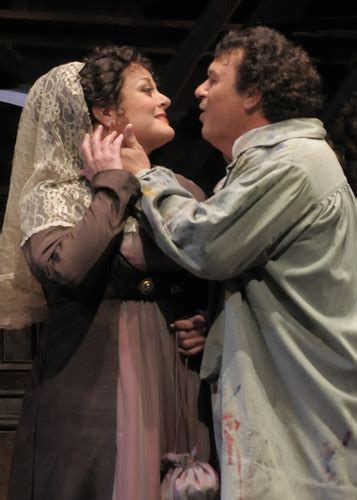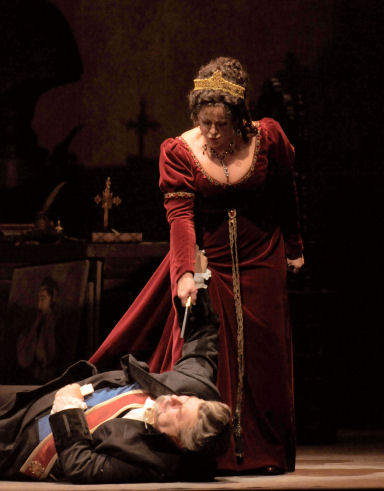Lyric Opera’s “Tosca” opens season with mixed success

Forget the javelin and triathlon. Should Chicago win the Olympic games, there should be an added event for successfully traversing the serpentine, criss-crossing queues of humanity munching on canapés in the ballroom on the Lyric Opera on opening night.
In the current economic crisis—-reflected in the Lyric’s unresolved contract negotiation with its orchestra musicians—opera companies across the country are falling back on standard repertory. To its credit, the Lyric Opera is offering relative rarities by Verdi, Berlioz and Janacek this season. But it is Puccini’s Tosca–-that evergreen musical drama of sex, violence and painting—that opened the company’s 55th season Saturday night at the Civic Opera House.
Few operas offer an evening of theater as primal and dramatic as Tosca. More than most Puccini tragedies, the opera requires acting singers, artists that can not only stand and deliver Puccini’s timeless music, but provide some degree of dramatic verisimilitude.
That side was largely well served Saturday, even with a rather tentative feel to the first act. Yet, it was the vocalism that proved more variable, resulting in a decidedly mixed opening-night performance, which met the opera’s challenges admirably without doing so memorably.
Most attention focused on Deborah Voigt in her local role debut.
When Voigt premiered the role of the volatile diva Floria Tosca in Miami in 2001, the soprano was at her most substantial, physically and vocally. It’s extraordinary how Voigt’s much-publicized weight loss has allowed her to go from near-immobility on stage to an animated and dynamic stage presence. The American soprano gave full rein to Tosca’s jealous mood-swings and brought fizzing intensity to her confrontation with the lustful Scarpia.
Yet there appears to have been some tradeoff vocally. While Voigt’s top notes remain gleaming and powerful, her voice appears to have lost some of its s former richness and amplitude in the middle and lower registers. Voigt’s Vissi d’arte was sensitively sung, abruptly curtailed final note apart, and she blended well with Vladimir Galozuine in their duets. Voigt was at her finest in Act 3 bringing firm dramatic focus to the final scene — even if the set’s stairway to heaven seemed to take takes forever to ascend.
Still, if in Italian repertoire, Voigt seems better suited to Verdi’s dramatic cut than the long lines of Puccini, her Cavaradossi just sounded miscast.
Vladimir Galouzine is a gifted artist with an imposing instrument, and was unforgettable in his 2000 company debut as the haunted Gherman in Tchaikovsky’s Queen of Spades.
Galouzine proved energetic and engaged dramatically and showed a nice rapport with Voigt, particularly in the final act. The Lyric clearly likes casting Galouzine in Italian roles, yet despite its heft and volume, the Russian’s baritonal tenor sounds ill-suited to Puccini in general and Cavaradossi in particular. His dark, burly voice is wanting in sheen and varied hues, with a short-breathed Recondita armonia and his E lucevan le stelle impassioned but hectoring. With his febrile Slavic sound and lack of tonal sweetness, O dolci mani sounded like an excerpt from A Life for the Tsar.

Marking the 30th anniversary of his Lyric debut was James Morris in a favorite role as the venal police chief Scarpia. The veteran bass-baritone is able to convey the villain’s courtly elegance as well as the malign chill, and after a long career with countless taxing Wotans, Morris’s voice has held up surprisingly well. He appeared to be husbanding his resources with an underpowered sprechstimme Te Deum in Act 1, yet rose to the confrontation of Act 2 with vocal force and dramatic fire, including an impressive stage fall over a chair after being dispatched by Tosca.
Craig Irvin was a serviceable Angelotti, John Easterlin, a better sung Spoletta than usual. Dale Travis continues the tradition of corny, over-the-top Sacristans, while Angela Mannino’s boyish voice hit the right artless note as the Shepherd.
Director Garnett Bruce moved the cast about efficiently. Christine Binder’s shadowy lighting took chiaroscuro to an extreme, leaving the prehistoric Zeffirelli-Mongiardino sets in near-darkness, likely by necessity. When the economy turns around, a new Tosca production should be a Lyric Opera priority.
Sir Andrew Davis’s conducting made up in lean brilliance and dramatic bite what it sometimes lacked in Mediterranean warmth. Donald Nally’s chorus sang magnificently in Act 1.
The Lyric Opera’s production of Tosca runs through Oct. 13. In January, Violeta Urmana, Marco Berti and Lucio Gallo will sing the principal roles. www.lyricopera.org; 312-332-2244.
Posted in Performances




